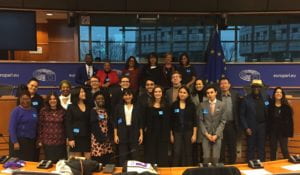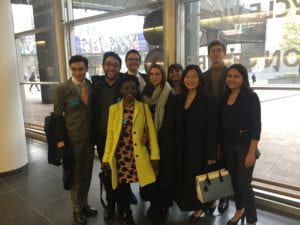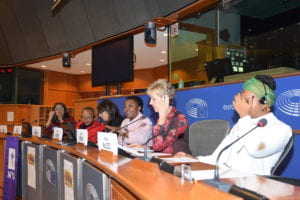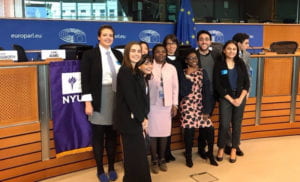9 November, 2017 was not a typical day for the European Parliament. That day, the Parliament’s Anti-Racism and Diversity Intergroup hosted NYU’s third conference on Race, Racism, and Xenophobia in a Global Context. Members of Parliament and the public heard from NYU faculty and students considering these issues through scholarly discussion and artistic expression.
This conference grew out of NYU’s unique willingness to allow students to grapple with the complicated issues they confront when studying away. The first conference, structured as an All-Campus Teach-In at NYU Florence on March 24, 2016, was developed by a student committee convened by NYU Florence Director Ellyn Toscano. As students observed the ongoing debate about “European identity” and migration, racism and Islamophobia, and as they also saw increasingly public racial violence in the US and student protests in response, they wanted to consider theses issues in a meaningful and informative way.
As the planning for the conference evolved, Ellyn explained the premise became that “the scope of this discussion on racism and intolerance be transnational and comparative. Racism must be understood as it operates in different historical and geographical contexts, reflecting local tensions and prejudices and intersecting with other important issues of class, gender, religion, nationality, marginality, citizenship, globalization and globalization.” The questions posed for the first conference included:
 How does racism and discrimination operate in different geographical contexts, reflecting local tensions and prejudices and intersecting with issues of nationality, class, gender, religion, marginality, citizenship, and globalization? How does location affect the way in which we think about the social constructions of race and race relations? What role do historical experiences of slavery, discrimination and colonialism play? How does the current migration crisis in Europe and mounting Islamophobia help us better understand the similarities and differences between the U.S. and Europe?
How does racism and discrimination operate in different geographical contexts, reflecting local tensions and prejudices and intersecting with issues of nationality, class, gender, religion, marginality, citizenship, and globalization? How does location affect the way in which we think about the social constructions of race and race relations? What role do historical experiences of slavery, discrimination and colonialism play? How does the current migration crisis in Europe and mounting Islamophobia help us better understand the similarities and differences between the U.S. and Europe?
Asking those questions lead to a continuing dialogue and a second conference in New York on October 28, 2016. A diverse group of students has been involved in all three conferences, starting as freshman and sophomores in Florence, they presented and performed in Brussels as juniors and seniors. The students introduced and moderated conference panels in addition to providing live performances – song, poetry, monologue. A short student film was also shown. With faculty from both New York and Florence present, it was, according to NYU’s Senior Vice President for University Relations and Public Affairs Lynne Brown, a “unique opportunity to showcase students and faculty” which is at the core of NYU’s mission.
A number of NYU faculty have also been involved in all three conferences, including members of the faculty committee Deb Willis and Dipti Desai, Awam Amkpa, Jason King, Pamela Newkirk, Paulette Caldwell, and Ann Morning. NYU Florence faculty included Deborah Spini and Alessandra Di Maio. In opening the conference, NYU Steinhardt Professor Dipti Desai noted that the motivation for all participating is furthering the conversations necessary to create “a world that is more just and equal.”
Italian Member of the European Parliament Cécile Kyenge participated in the first Race, Racism, and Xenophobia conference in Florence and the second in New York. A member of the Anti-Racism and Diversity Intergroup, Ms. Kyenge was so impressed that she invited NYU to organize a conference for the European Parliament and the public in Brussels. During her opening remarks on November 9, Ms. Kyenge praised NYU’s interdisciplinary efforts, noting that the university does not “stop at scholarly discussion, but also takes a creative approach.”
That is in part what the students found inspiring. Helen You, a CAS senior who has participated in all three conferences, described the vibrancy of the event. “As someone who is both an IR major and potentially going to law school, but who danced and played music throughout my life, I really appreciate just how diverse we have made this conversation. I mean, we have everyone from the Law School to Tisch siting in this room to talk about issues that span across all departments and that is just amazing.” She and other students expressed their gratitude for the professors and administrators helped to make the conferences happen. Helen also especially thanked NYU Florence Director Ellyn Toscano on behalf of the students, saying, “So often, students have a passion and an idea in their heads, but they don’t have the opportunity to explore it and create something meaningful. You gave us the confidence and the voice to share our stories and make this conference a platform for change and we never thought that something like this could happen. Thank you so much for everything you have done for us and your support.”
The conference was well-received in Brussels, with Parliamentarians and other participants very engaged. Even if you missed the opportunity to participate in Brussels, New York, or Florence, this is not the end of these conversations at NYU. According to student participant Eilish Anderson, “I sincerely hope that we were able to inspire the people watching the conference to take action in fighting against hate in the world, particularly through policy change. Even after the third edition of this conference, it’s still just the beginning. Where will we go next?”



